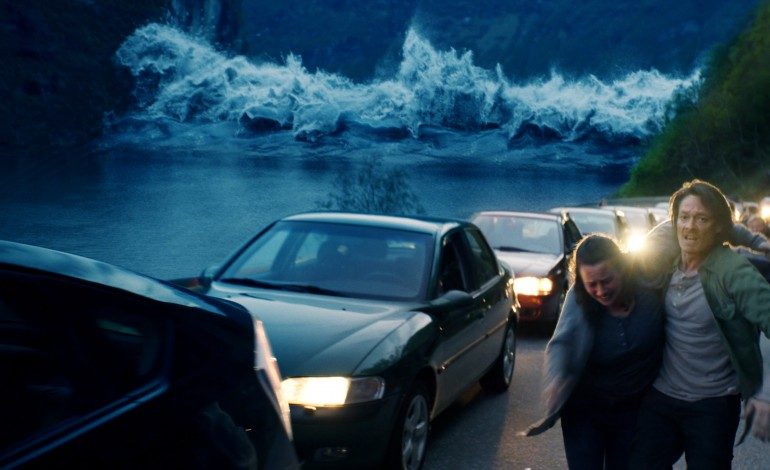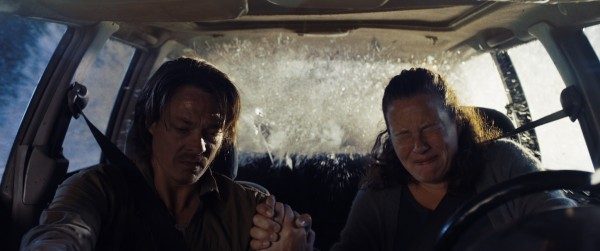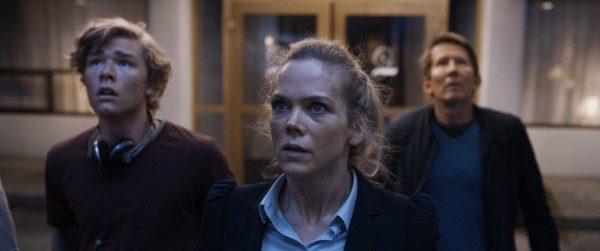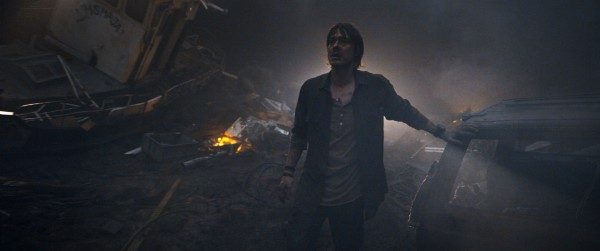

Yes, there is a wave in Roar Uthaug’s enthralling disaster movie The Wave (Bølgen) and it’s a magnificently crafted bit of computer-generated magic to boot. Perhaps more enthralling and certainly more endearing is The Wave, while modeled nearly to a tee to that of classical Hollywood disaster flicks (Earthquake, The Poseidon Adventure, etc.), is a Norwegian export that sharply reminds of us that films rooted in formula needn’t be such a bad thing at all. It’s all in the execution and Uthaug and his crew ably play with suspense, offer some beautiful captured shots of gorgeous scenery (most of which will be toast by the end of the movie) all the while building identifiable characters that are easy to root for.
It helps immensely that the disaster that strikes in The Wave is actually vaguely plausible. Given the numerous mountainsides that sharpen the Norwegian landscape, there’s certainly a smidgen of a chance that if any portion of the rocky terrain were to fall into a neighboring fjord, an idyllic hamlet like Geiranger (where The Wave is set) may become a thing of history because of the impact of a thundering wave (the waves here reach as high as 250 feet). We might have to check in with an erudite geologist like leading character Kristian (Kristoffer Joner, The Revenant) to be completely sure but it certainly sounds more possible than the mashugana that took place in last years’ Hollywood outing San Andreas, for instance. Rock slides have occurred in the region prior and the film even exclaims, “All experts agree there will be another rock slide. No one knows when.”
Remarkably, Kristian is admirably kept down to believably human form rather than taking the guise of a superhero capable of bending the Earth itself. It’s little touches like this that keep The Wave so balanced and yet also quite refreshing. The film opens leisurely, letting the inevitable suspense build up inside just long enough to the point where we’re really ready for it. Uthaug and screenwriters John Kåre Raake and Harald Rosenløw-Eeg let us luxuriate in the warmth of a cozy family of four: Kristiann, his wife Udun (Ane Dahl Torp), their sullen teenage son Sondre (Jonas Hoff Oftebro) and adorable young daughter Julia (Edith Haagenrud-Sande). The family is prepping a move from Geiranger to the big city where Kristian has just accepted a job at an oil company. The move takes a backseat due to looming disaster. Something that for the sake of genre conventions, Kristian is first to catch wind of. The film is sharp enough never to get too bogged down by its science and to never spend too screen time with needless exposition. The build-up reaches its boiling point when Geiranger’s panic button is pushed, alerting the sleepy, yet beautiful community that they have ten minutes to clear.
To this extent, Uthaug utilizes classical thriller instincts to a terrific effect. Each shot of the CG behemoth is matched with one of our central characters for maximum emotional impact. It seems relatively simple on paper: bring the scope down to a human level, yet so many modern movies fixate on the fancy money shots rather than attempting to show their consequences or explore the reactions of their characters. Elemental, filmmaking 101, right? The wave is an impressive marvel of a special effect, but Uthaugh and crew make it ever more powerful by carefully alerting us of where their characters are- Kristian and Julia are quickly fleeing from their old house while Udun and Sondre are trapped in the hotel that Udun manages. Simply, this creates a geography that not only makes sense but builds an accessible through-line. The Wave isn’t particularly deep nor does it need to be, but it is skillfully made entertainment that sparks with a sense of the magic and possibility that big-budget Hollywood films seem to have lost focus of in recent years.
Equally refreshing is Kristian and Udun are both allowed to serve as their own heroes in the movie. The balance on terms of gender is never underlined nor even casually suggested: both are simply allowed to be strong, forthright characters. The same stroke of generosity could be said of the children as well- Julia, the smallest must surely be scuttled off to safety, but Sondre (who looks like the Euro-equivalent of kid who might show up in a Richard Linklater film) is granted moments of fearfulness and passivity. Yes, The Wave goes the conventional route from time to time- as disaster movies decree, there must be a few sacrificial lambs (and a “Shelley Winters” type so to speak) but there’s a genuinely felt sense of humanity as well. Is it really worth destroying an entire village if we never get to know or care about any of its township?
The Wave was Norway’s official selection for last years’ Academy Awards and while the film wasn’t acknowledge (perhaps it’s a little too mainstream and popcorn-y), it was a major success in its native country. However, the film is a novel reminder that Hollywood conventions may well be alive and flourishing albeit outside American borders. Ulthaug, though, seems a rare find in the way he shapes and sculpts such vivid scope without ever succumbing to utter bombast. Something which will hopefully come in handy as the filmmaker shift towards Hollywood- he is slated to direct an upcoming reboot of Tomb Raider.
Verdict: 3 out of 5
The Wave is a tremendously fun ride. Confidently made, gorgeously filmed (director of photography John Christian Rosenlund deserves ample credit for composing tremendous vistas of the alluring Geiranger) and delicately modulated, Roar Ulthaug (perhaps the best name ever for a filmmaker) outdoes the Hollywood mode of contemporary disaster movies by playing right into their classical conventions. The film isn’t groundbreaking in any way but displays a startling display of talent both in front of and behind the camera. Those leery of subtitles have little to fret about, The Wave is accessible and lively entertainment.



